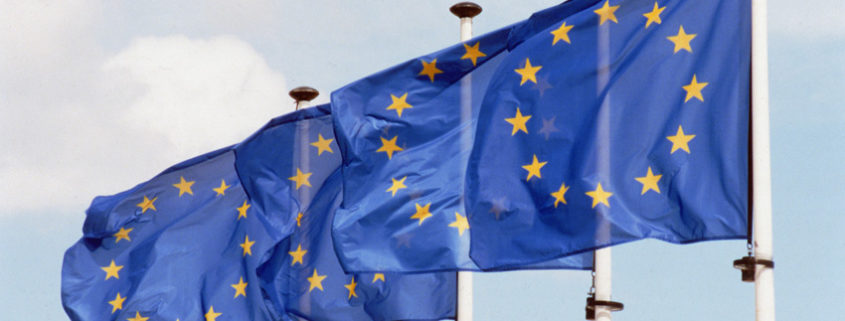Implementation and aims of Union Customs Code (UCC)
The adoption of the UCC in 2013 and its entry into force in 2016 was forced by the modernization of the EU customs and trade sector. It regulates uniform administration of customs duties and other import taxes in the EU Member States. Furthermore, this ensures the application of other related international trade regulatory measures towards the third countries that are trading with the European Union.
The Union Customs Code (UCC) was applied to the whole territory of the European Union (EU) on 1 May 2016. The UCC has been implemented through secondary legislation in the form of a Delegated Act (DA), an Implementing Act (IA) and their associated annexes.

Customs legislation is adopted at EU level although its implementation is a responsibility of the Member States via their national customs administrations. Since 2016 the Union Customs Code provides a refreshed and comprehensive legal framework for customs rules and procedures in the EU customs territory. It is adapted to the modern trade realities and to the global standards so as to facilitate EU businesses in their international activities. Major progress has been achieved in making all customs processes fully electronic as required under this new Code18. Customs also apply more than 60 pieces of non-customs legislation as part of their role of implementing the border aspects of other common EU policies. Moreover, legislation and non-legislative tools enable EU customs authorities to cooperate with each other to combat security and financial risks. Furthermore, there are international cooperation agreements with many third countries.
The main aim of the UCC and its related DA and IA is the creation of the paperless environment for the international trade operations throughout the EU and its Member States. The trade facilitation is achieved via the electronic exchange of all related to the customs formalities documentation. This happens through a full electronic declaration of customs procedures. Another objective of UCC is the ensuring of more harmonized administration of customs duties in the tax and customs authorities of the Member States (compared to the level achieved since the adoption of the CCC in 1992). The safety and security-related data and cooperation is also a certain aspect of the UCC scope.
PRIORITY AREAS OF OPERATIONS
Implementation of the Union Customs Code
A significant task ahead for Member States’ customs administrations is the reassessment of many of the authorizations granted under the previous customs’ legal framework, the Community Customs Code. Authorisations are granted to economic operators for different purposes, mostly to allow them to apply some simplified or less cumbersome customs procedures. A good example is an authorization granting Authorised Economic Operator status. As the conditions for granting the authorisations may have changed under the Union Customs Code, and have become more stringent and more uniform in some cases, existing authorisations need to be re-assessed to ensure strict application of the new rules.
Developing a comprehensive mid and long-term strategy for customs IT systems
As the Commission noted in its Governance Communication, the cost of maintaining the increasingly sophisticated EU-wide customs electronic systems over the years to come will be significant and solutions are needed on how to manage this. In addition, there are longer-term issues of how to avoid duplication of effort and resources in the updating of old electronic systems in each of the Member States. At the same time, electronic systems are indispensable for the efficient and modernized operation of the customs union.
Since then, the Member States and the Commission have engaged in wide-ranging discussions to try to arrive at a more efficient, cost-effective and streamlined approach to the management of the electronic systems. Some progress has been made in identifying potential solutions, having regard to the Digital Agenda, the potential for cross-sector interoperable approaches, and the implications of technological innovations over the coming years.
Developing the governance of the Customs Union
The Council and the Commission agree on the need for long-term overarching policy and shared operational management vision for the Customs Union. This will allow necessary decisions to be taken in an inclusive and partnership manner across the different policies with the different stakeholders, taking everybody’s needs into account.
Continuing to develop the Customs Union Performance
Continuous policy monitoring, analysis, and assessment of possible impacts are essential parts of governance of the Customs Union. To this end, the Commission has been working on developing the Customs Union Performance tool to help steer policy formulation and strategic decision making. This tool should allow the systematic assessment of the Customs Union’s performance against its strategic objectives in terms of efficiency, effectiveness, and uniformity by analyzing key trends and thus identifying areas for improvement. It is an indispensable tool for raising awareness of the Customs Union’s achievements and added value among its main stakeholders and the broader public.
Single Window
The Commission is developing work on an EU Customs Single Window environment that would permit an economic operator to submit data required for a wide range of regulatory purposes (e.g. veterinary, sanitary, environmental, etc.) in a standardized format to multiple recipients and via harmonized access points. An EU Customs Single Window could bring about multiple gains, benefitting both the trade community and regulatory authorities. This is a complex area where care is needed to avoid duplications and unnecessary cost.
In light of this, the Commission and the Member States have agreed to implement the Customs Single Window environment through a phased approach. The first phase consists in the provision of tools to connect EU certificate systems with national systems so as to enable the automated verification by Member States’ customs authorities of electronic certificates issued by other authorities. A possible next phase could aim to provide a framework to support the establishment of an integrated and coherent environment for customs Single Window services in the EU.
Improvements in customs and tax cooperation
The need for improvements in cooperation between customs and tax authorities is crucial, in particular given that customs ensure the correct application of VAT and excise duties on imports of goods. The merits of cooperation, stressed on many occasions by the Council, the European Parliament, the European Court of Auditors and the Commission, include achieving a better balance between controls and trade facilitation, eliminating mismatches between rules, helping to combat fraud and more streamlined administrations.
Continuing the involvement of trade in EU customs legislation
Trade continues to play a crucial role in helping to ensure that customs procedures and rules are workable and appropriately balance the requirements of legitimate traders with effective controls. The Commission has been developing further the mechanism to strengthen trade input at different stages in the procedures by reviewing the terms of reference of the main consultation body – the Trade Contact Group. Besides the main platform, the Commission also promotes joint customs-trade discussions at the various stages of development and implementation of legislation.
Alignment of the legislation as well as freedom to implement national deviations
UCC lays the backbone for the customs operations harmonization across all Member States Customs Authorities. The legal text provides the abstract basis for the operation of the customs administrations in order to be able to cooperate in a coordinated manner. However, at the same time, each Member State needs to make decisions for certain aspects of the customs formalities to specify the peculiarities of its business processes from legal, business and technical perspectives. Each Member State or a country in accession period needs to prepare a gap analysis of its legislation as well as its application portfolio to assess the necessary adaptations in its capabilities so as to become a well-functioning part of the EU Customs Union.
PRIORITY ISSUES AHEAD
The development of the Customs Union is a dynamic process and in recent years MS administrations have made progress in many areas linked to better management of the Customs Union. The cooperation in these areas must continue. At the same time, however, the Commission believes that EU customs must look at new priority issues in order to deal with the challenges ahead. These are as follows:
- Managing Brexit
- Strengthening controls and tackling fraud
- Enabling innovation
- Optimizing customs electronic systems and their use
- Greater use of monitoring of EU customs law
- Improving the efficiency of customs administrations
- Dealing with the challenges of e-commerce
- Capitalizing on the Customs Union to improve EU security
- Continuing to work on international relations
The Customs Union have a new legal framework, new methods of working and new IT tools. These must now come together in the next few years in a coherent implementation that encourages compliance and targets risk areas, while reaching out to other policy areas, notably security, to strengthen EU common policies.
photo: EU





Leave a Reply
Want to join the discussion?Feel free to contribute!